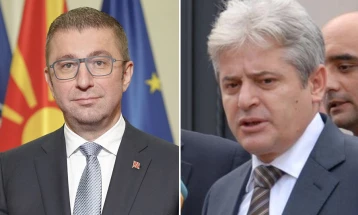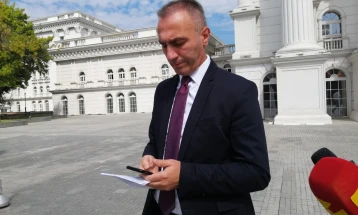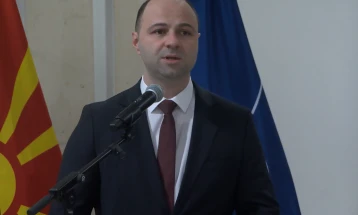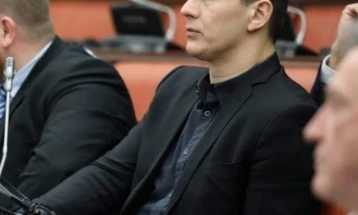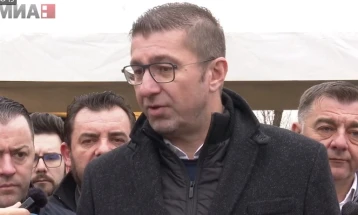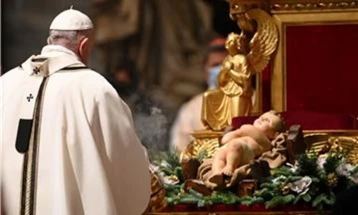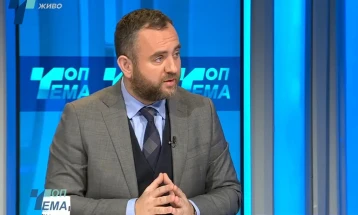Pendarovski: Constitutional Court to proactively distinguish itself as protector of human rights and freedoms
- The Constitutional Court should proactively distinguish itself as protector of human rights and freedoms. One way is through constitutional changes and introduction of the constitutional appeal as legal means for protection of the rights and freedoms. I hope that professionals and politicians will soon understand the meaning of the constitutional appeal as an important segment in reforms and a step towards strengthening the system for protection of human rights and freedoms, said President Stevo Pendarovski in remarks at international conference hosted Friday by the Constitutional Court, in cooperation with the OSCE Mission to Skopje, on occasion of the court's 60th anniversary.
- Post By Ivan Kolekevski
- 11:50, 15 March, 2024
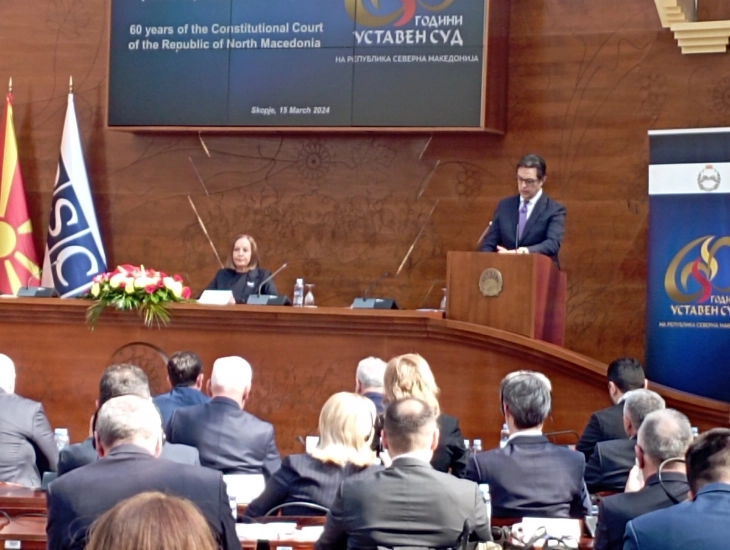
Skopje, 15 March 2024 (MIA) - The Constitutional Court should proactively distinguish itself as protector of human rights and freedoms. One way is through constitutional changes and introduction of the constitutional appeal as legal means for protection of the rights and freedoms. I hope that professionals and politicians will soon understand the meaning of the constitutional appeal as an important segment in reforms and a step towards strengthening the system for protection of human rights and freedoms, said President Stevo Pendarovski in remarks at international conference hosted Friday by the Constitutional Court, in cooperation with the OSCE Mission to Skopje, on occasion of the court's 60th anniversary.
President Pendarovski said the Constitutional Court has a long tradition dating from the time of former Yugoslavia, starting its operations within the Socialist Republic of Macedonia in 1964.
"I am mentioning this fact because introduction of the constitutional judiciary was a rare and unusual step in a one-party socialist state such as former Yugoslavia, undoubtedly representing a positive step in restricting political voluntarism and framing the domination of the former ruling political structure. The Constitutional Court continued to operate through the 1991 Constitution but amid significantly altered circumstances of an independent democratic state. In this regard, the work and the decisions of the former Court structures represented an important safeguard that transition to a democratic and pluralistic society resting on the principles of rule of law, protection of human rights and freedoms, division of power and market economy would take place within the framework of the new constitution," noted Pendarovski.
Until 1991, he added, Macedonia never had a democratic experience, so one can imagine the responsibility of the former constitutional judges, who carried the burden of that time and deserve recognition for their work during the key period for the state and the democratic system.
He said the Constitutional Court also played a crucial role during the covid pandemic, when the parliament was dissolved and the country had a caretaker government tasked with organizing elections.
"In a time when the government, due to the state of emergency, was able to pass decrees that restricted human rights and freedoms, the Court was the key institution that regularly controlled the constitutionality of the decrees and the decisions," said Pendarovski.
The President noted that the Constitutional Court decisions and elaborations were extremely important for him when taking the decisions in his jurisdiction during the emergency.
"I believe it is fair to say that the Constitutional Court has demonstrated exceptional sensibility for the national and international standards in the observance and protection of human rights and freedoms, which was crucial for the Council of Europe's positive assessment on the restriction of these rights during the emergency, seen through the prism of the European Convention of Human Rights. Given this experience, I believe the Constitutional Court should proactively distinguish itself as protector of human rights and freedoms in the future," said Pendarovski.
According to him, one of the ways to achieve this is through constitutional changes and introduction of a constitutional appeal as legal means for protection of rights and freedoms.
"The constitutional appeal is a verified efficient means for constitutional-judicial protection of human rights and freedoms. Prior efforts to introduce this facility have been unsuccessful and I hope that both politicians and professionals will understand its significance in the near future - as an important segment in reforms and a step towards strengthening the system of protecting human rights and freedoms," stressed Pendarovski.
In this regard, he highlighted the importance of several decisions by the Constitutional Court related to the violation of the right for freedom of expression, including the 27 April 2017 storming of the Parliament, the venue of today's conference.
"Besides attacking our democratic constitutional order and violence directed at MPs, journalists reporting from the Parliament's constitutive session were also attacked. In an attempt to prevent a smooth transition of power, thugs organized by structures of the then-authorities attacked journalists in order to prevent their reporting on the events. Your decisions that established a violation of the right to freedom of expression are a just satisfaction not only for attacked journalists but also for the entire democratic public in the country," underlined President Pendarovski.
Parliament Speaker Jovan Mitreski, Caretaker Prime Minister Talat Xhaferi, Justice Minister Krenar Lloga, United States Ambassador Angela Aggeler and Constitutional Court President Dobrila Kacarska are also set to address the conference, which brings together representatives of constitutional courts from other countries, international institutions, media and NGOs.
